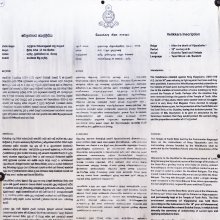Galava, Gālava: 16 definitions
Introduction:
Galava means something in Hinduism, Sanskrit. If you want to know the exact meaning, history, etymology or English translation of this term then check out the descriptions on this page. Add your comment or reference to a book if you want to contribute to this summary article.
Galava has 14 English definitions available.
Images (photo gallery)
Languages of India and abroad
Sanskrit dictionary
[Deutsch Wörterbuch]
Source: Cologne Digital Sanskrit Dictionaries: Böhtlingk and Roth Grosses Petersburger WörterbuchGālava (गालव):—m.
1) Name eines Baumes, Symplocos racemosa Roxb., [Amarakoṣa 2, 4.2, 13.] [Trikāṇḍaśeṣa 3, 3, 414.] [Hemacandra’s Abhidhānacintāmaṇi 1159.] [Anekārthasaṃgraha 3, 699.] [Medinīkoṣa v. 37.] eine weissblühende Species (śvetalodhra) [SVĀMIN] zu [Amarakoṣa im Śabdakalpadruma] eine Art Ebenholz (kenduka) [Śabdacandrikā im Śabdakalpadruma] —
2) Nomen proprium eines alten Weisen und Lehrers, nach dem Hariv. ein Sohn, nach dem [Mahābhārata] ein Schüler Viśvāmitra’s, [Trikāṇḍaśeṣa] [Hemacandra’s Anekārthasaṃgraha] [Medinīkoṣa] [Bṛhadāranyakopaniṣad 2, 6, 3. 4, 6, 3.] [Weber’s Indische Studien 3, 273.] Grammatiker [Yāska’s Nirukta 4, 3.] [Pāṇini’s acht Bücher 6, 3, 61. 7, 1, 74. 3, 99. 8, 4, 67. -] [Mahābhārata 1, 331. 2, 110. 292. 3, 8263. 5, 3720. fgg.] [9, 2992. 12, 10555. fgg.] [13, 251. 1349. fgg.] [Harivaṃśa 454.] sakhā sa gālavo yasya (brahmadattasya) yogācāryo mahāyaśāḥ . śikṣāmutpādya tapasā kramo yena pravartitaḥ .. [1049. 1462. 1769.] [Śākuntala 112, 14] (Schüler Kaśyapa’s). [Vikramorvaśī 35, 2] (Schüler Bharata's). [Viṣṇupurāṇa 281,] [Nalopākhyāna 5.] [Bhāgavatapurāṇa 8, 13, 15.] [Mārkāṇḍeyapurāṇa 20, 42.] pl. seine Nachkommen [Harivaṃśa 1467.]
--- OR ---
Gālava (गालव):—
2) [?Z. 3 Weber’s Indische Studien 3, 273] m. pl. als Name einer Schule.
Source: Cologne Digital Sanskrit Dictionaries: Sanskrit-Wörterbuch in kürzerer FassungGālava (गालव):—m. —
1) *Symplocos racemosa oder eine andere weisse Species. —
2) *eine Art Ebenholz. —
3) Nomen proprium eines alten Lehrers. Pl. sein Geschlecht. —
4) Pl. eine best. Schule.
Sanskrit, also spelled संस्कृतम् (saṃskṛtam), is an ancient language of India commonly seen as the grandmother of the Indo-European language family (even English!). Closely allied with Prakrit and Pali, Sanskrit is more exhaustive in both grammar and terms and has the most extensive collection of literature in the world, greatly surpassing its sister-languages Greek and Latin.
See also (Relevant definitions)
Starts with: Galavaara, Galavagadi, Galavagadula, Galavala, Galavalli, Galavanda, Galavani, Galavara, Galavarta, Galavartta, Galavasana, Galavasmriti, Galavata, Galavata-Vanda-Vana-Vani, Galavataka, Galavati, Galavatirtha, Galavattige.
Ends with: Aggalava, Vaikritigalava.
Full-text (+12): Galavi, Galavagadula, Uttaradisha, Galavasana, Kenduka, Shitimamsa, Ekapadagalavasana, Akshibheshaja, Kendu, Golava, Babhravyam, Pani, Kaushikagotra, Pratishthanapura, Kuteshvara, Madhavi, Haryashva, Karnika, Dhanvantari, Paricarya.
Relevant text
Search found 35 books and stories containing Galava, Gālava; (plurals include: Galavas, Gālavas). You can also click to the full overview containing English textual excerpts. Below are direct links for the most relevant articles:
The Markandeya Purana (by Frederick Eden Pargiter)
Canto LXXX - The Sāvarṇaka Manvantara
Canto XX - The Story of Kuvalayāśva
List of Mahabharata people and places (by Laxman Burdak)
Mahabharata (English) (by Kisari Mohan Ganguli)
Section CXVIII < [Bhagavat-Yana Parva]
Section CXVI < [Bhagavat-Yana Parva]
Section CXV < [Bhagavat-Yana Parva]
Amarakoshodghatana of Kshirasvamin (study) (by A. Yamuna Devi)
Flora (5): Trees < [Chapter 5 - Aspects of Nature]
Puranic encyclopaedia (by Vettam Mani)
